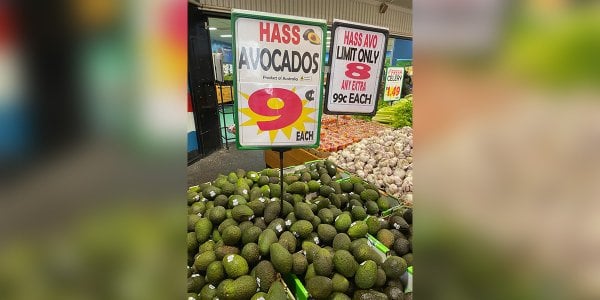Avocado prices plunge to 9c amid fruit surplus, group targets increasing demand
We here at the SDC know that, above anything else, cost is one of the biggest factors when it comes to deciding what to put in our trolleys.
The sticker price can mean the difference between sticking to our weekly shop budget or dipping into our savings for extra cash.
But we have some great news for you: If you like avocados, this is the perfect time to buy them. Recently, the price of this fruit dropped significantly.
In Brisbane, avocados have recently been observed at Blunder Road Fruit Market being sold at a measly nine cents each—kilogram bags go for just 99 cents apiece.
A shopper posted a photo of the price tag on social media, saying: ‘I saw someone posted about this a few months back. I went back today and the deal was back!’
With prices like these, members are now free to forget about their budget for a while and indulge in as many avocados as they like.
Someone even joked: ‘I now might be able to afford a house,’ referring to the joke about not affording a house in today’s tough economic climate.
And while consumers have been rejoicing, this slab of good fortune does beg the question: Why have the prices dropped so low?
Avocados Australia explained that there are a number of contributing factors. Some of those factors include quality, pack type, size, and supply and demand.
But the root of the issue, it appears, is that production of the fruit is high.
In the 2021-2022 financial year, Australia produced over 122,197 tonnes of avocados. This was an increase of 56 per cent compared to the prior year.
Queensland was by far the greatest contributor to the surge, accounting for 48 per cent of all production.
In the future, the supply is expected to get even more abundant.
Avocado farmers are predicted to beat production records, with the supply forecast to increase by 118 per cent, with an average of 170,000 tonnes per year until 2026.
The excess of the fruit in markets has forced farmers to simply dispose of them on occasion, as seen last year when a photo of large mounds of lower-grade avocados carelessly discarded in a rubbish tip in Far North Queensland garnered attention from the public.
At the time, the farmers explained that they couldn’t transport the fruits to major cities due to the increasing cost of labour and shipping.
More than that, there is another reason why the surplus for avocados is high and it was the people’s increasing love for the ‘smashed avo’.
As brunch-goers’ love for the superfood grew, farmers invested in planting more and more trees to keep up.
Then, when the pandemic hit, and restaurants and cafes had to close their doors, the lack of demand for the produce left farmers with massive quantities of avos that had to be plucked before it rotted.
The silver lining? Fortunately, there are ways consumers can help.
In a statement, Avocados Australia encouraged shoppers to purchase avocados in retail stores and support local farmers.
‘Be it Shepard or Hass, avocados are incredibly healthy and versatile, they add something special to a wide range of meals,’ they added.
On the market side of things, retailers are also appear to be taking stock of the avocado surplus.
Budget retailer ALDI earlier committed to source all of its avocado stock domestically ahead of summer.
‘By making this commitment this year, we are proud to be forming long term relationships with local growers and supporting them and their businesses to grow,’ said Matt Atley, Group Director for Produce at ALDI Australia.
‘Seeing that Avo farmers around Australia are having a strong start to the season, particularly through the September to February harvesting period means we can meet our customers’ insatiable demand for avos with purely Aussie fruit.’
‘Our Aussie first supplier policy means that we turn to our local Aussie growers for more than 97 per cent of the produce in our stores. It is only when we can’t get the volume, or the items are out of season, that we have to look outside Aussie shores to meet demand,’ he added.
Avocados Australia also welcomed the export of Western Australian avocados to Thailand, along with the announcement of following through on the blooming relationship through ‘retaining a strong presence’ in the Southeast Asian country’s local market.

Did you notice the drop in avocado prices in your local market, members? How do you serve this delicious fruit? Let us know in the comments below!
The sticker price can mean the difference between sticking to our weekly shop budget or dipping into our savings for extra cash.
But we have some great news for you: If you like avocados, this is the perfect time to buy them. Recently, the price of this fruit dropped significantly.
In Brisbane, avocados have recently been observed at Blunder Road Fruit Market being sold at a measly nine cents each—kilogram bags go for just 99 cents apiece.
A shopper posted a photo of the price tag on social media, saying: ‘I saw someone posted about this a few months back. I went back today and the deal was back!’
With prices like these, members are now free to forget about their budget for a while and indulge in as many avocados as they like.
Someone even joked: ‘I now might be able to afford a house,’ referring to the joke about not affording a house in today’s tough economic climate.
And while consumers have been rejoicing, this slab of good fortune does beg the question: Why have the prices dropped so low?
Avocados Australia explained that there are a number of contributing factors. Some of those factors include quality, pack type, size, and supply and demand.
But the root of the issue, it appears, is that production of the fruit is high.
In the 2021-2022 financial year, Australia produced over 122,197 tonnes of avocados. This was an increase of 56 per cent compared to the prior year.
Queensland was by far the greatest contributor to the surge, accounting for 48 per cent of all production.
In the future, the supply is expected to get even more abundant.
Avocado farmers are predicted to beat production records, with the supply forecast to increase by 118 per cent, with an average of 170,000 tonnes per year until 2026.
The excess of the fruit in markets has forced farmers to simply dispose of them on occasion, as seen last year when a photo of large mounds of lower-grade avocados carelessly discarded in a rubbish tip in Far North Queensland garnered attention from the public.
At the time, the farmers explained that they couldn’t transport the fruits to major cities due to the increasing cost of labour and shipping.
More than that, there is another reason why the surplus for avocados is high and it was the people’s increasing love for the ‘smashed avo’.
As brunch-goers’ love for the superfood grew, farmers invested in planting more and more trees to keep up.
Then, when the pandemic hit, and restaurants and cafes had to close their doors, the lack of demand for the produce left farmers with massive quantities of avos that had to be plucked before it rotted.
The silver lining? Fortunately, there are ways consumers can help.
In a statement, Avocados Australia encouraged shoppers to purchase avocados in retail stores and support local farmers.
‘Be it Shepard or Hass, avocados are incredibly healthy and versatile, they add something special to a wide range of meals,’ they added.
On the market side of things, retailers are also appear to be taking stock of the avocado surplus.
Budget retailer ALDI earlier committed to source all of its avocado stock domestically ahead of summer.
‘By making this commitment this year, we are proud to be forming long term relationships with local growers and supporting them and their businesses to grow,’ said Matt Atley, Group Director for Produce at ALDI Australia.
‘Seeing that Avo farmers around Australia are having a strong start to the season, particularly through the September to February harvesting period means we can meet our customers’ insatiable demand for avos with purely Aussie fruit.’
‘Our Aussie first supplier policy means that we turn to our local Aussie growers for more than 97 per cent of the produce in our stores. It is only when we can’t get the volume, or the items are out of season, that we have to look outside Aussie shores to meet demand,’ he added.
Avocados Australia also welcomed the export of Western Australian avocados to Thailand, along with the announcement of following through on the blooming relationship through ‘retaining a strong presence’ in the Southeast Asian country’s local market.
Key Takeaways
- Avocado prices have drastically dropped to just nine cents each in Brisbane due to a surge in production.
- In the 2021-2022 financial year, Australia produced over 122,197 tonnes of avocados, a 56 per cent increase from the previous year.
- Avocado production is expected to continue growing, with Australia projected to produce an average of 170,000 tonnes per year by 2026.
- Avocados Australia encourages Australians to buy Australian avocados to support local
growers.
Did you notice the drop in avocado prices in your local market, members? How do you serve this delicious fruit? Let us know in the comments below!








